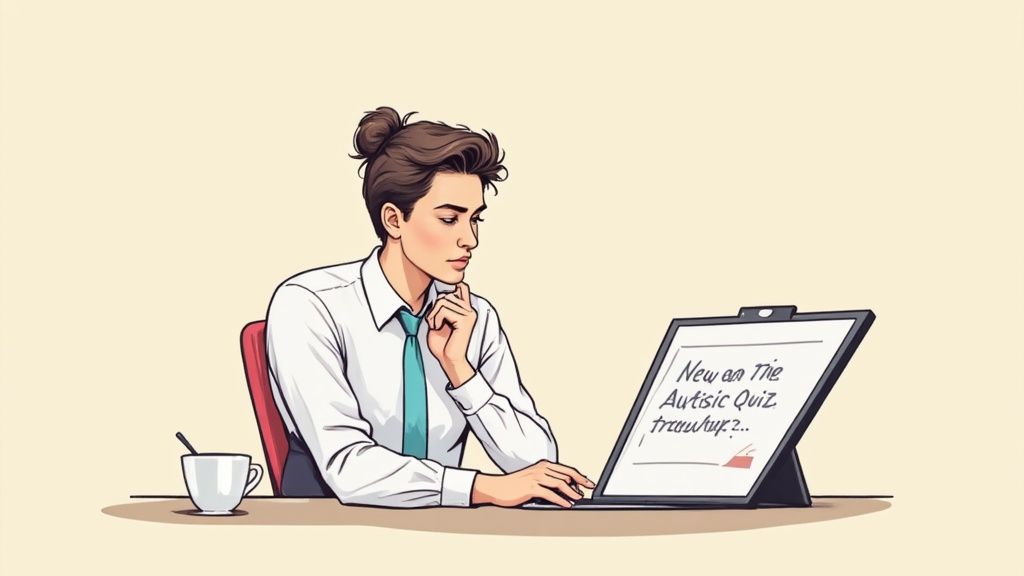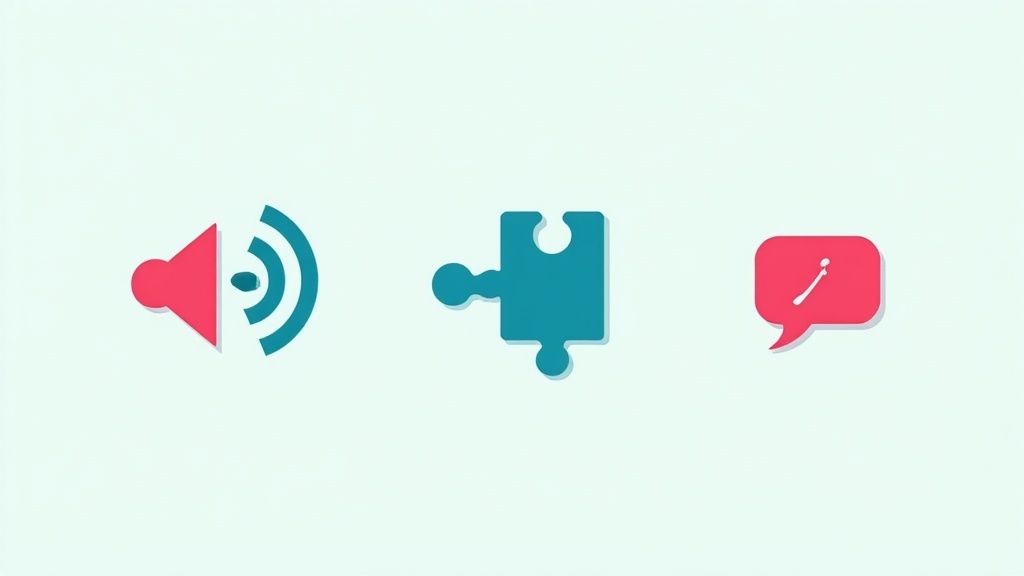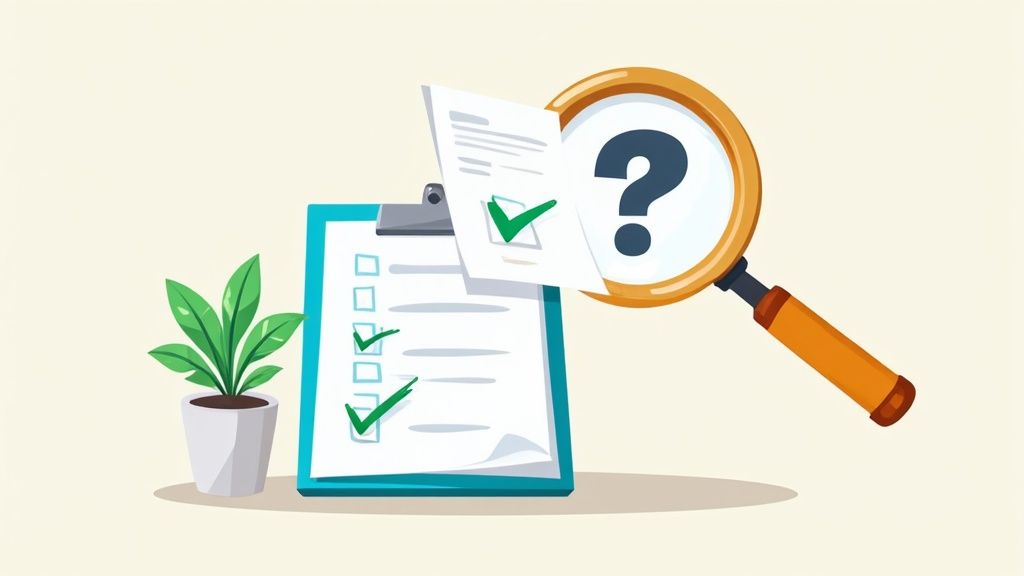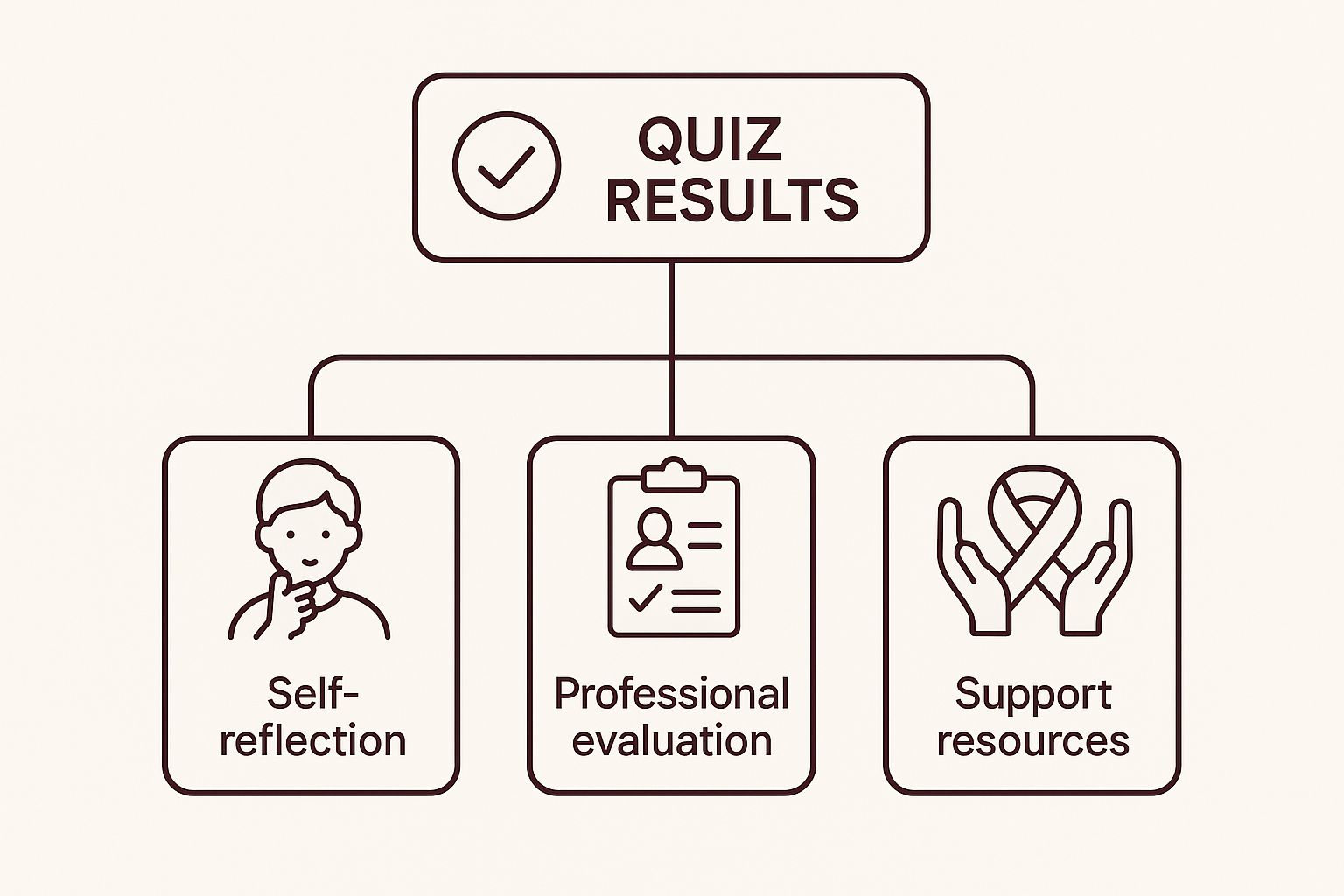If you've found yourself typing "Am I autistic?" into a search bar, you're already on an important path toward self-discovery. An online quiz can be a useful first step, but it's crucial to see it for what it is: a guide for self-reflection, not a diagnostic tool. This is your journey, one to be approached with compassion and genuine curiosity.
Starting Your Journey of Self-Exploration
The question "Am I autistic?" often comes up after years of feeling just… different. You felt it, but you couldn't quite put a name to it. If that sounds familiar, you are far from alone. Many adults find themselves exploring this possibility later in life, finally seeking clarity on lifelong patterns they've noticed in social interactions, sensory experiences, or intensely focused interests.
Think of this guide as a safe, supportive space for that very exploration. It’s not a clinical manual, but more like a map to help you navigate your own inner world. Our goal is to offer a gentle framework for what you might be feeling, validating your questions and easing the uncertainty that often comes with them.
Why Are More Adults Asking This Question Now?
Simply put, awareness has grown immensely, bringing adult autism into the spotlight. The public conversation is expanding, and with it comes a much better understanding of how autism can present in adults—especially in those who have spent years "masking" their traits to fit in.
This isn't just a feeling; it's reflected in the data. As of 2025, it’s estimated that autism spectrum disorder (ASD) affects approximately 1 in 31 children in the United States. That’s a huge jump from the year 2000, when the rate was nearly five times lower. This change isn't because autism is more common, but because screening has improved and our understanding of the spectrum has become far more inclusive. You can explore more statistics about autism awareness to get the full picture.
This guide includes a self-reflection quiz designed to help you organize your thoughts. It’s built to shed light on your personal experiences with:
- Social communication and relationships
- Sensory processing and sensitivities
- Personal routines and passionate interests
Remember, this process is about empowerment. Whatever you discover here are tools for self-compassion and deeper understanding, no matter the outcome. This is your personal journey, and every step you take is a win in getting to know yourself better.
Understanding Autism in Adulthood
Before you dive into any "am I autistic quiz," it's helpful to first hit pause and reframe what autism really means, especially in adults. Let's move past the outdated, one-dimensional stereotypes you've probably seen.
A much better way to think about it is that the autistic brain runs on a different 'operating system'. It's not a buggy or broken system, just one that's wired to process the world in a fundamentally different way from the neurotypical majority.
This unique wiring leads to distinct experiences, particularly in three key areas of life: social interaction, sensory processing, and personal interests. Getting a feel for these differences is the first step in seeing if they resonate with your own story.
Navigating a Neurotypical World
For many autistic adults, social situations can feel like trying to run a Mac program on a Windows PC. The basic code just doesn't translate easily. You might find yourself missing the subtext in conversations, preferring communication that is direct and literal, or feeling completely wiped out by small talk.
This isn't about a lack of desire for connection. In fact, many autistic people feel empathy deeply and want strong, meaningful relationships. The real challenge is the nonstop mental gymnastics required to interpret neurotypical social rules—a process often called masking. The result? A "social hangover" that leaves you feeling utterly drained after events.
The Power of Special Interests
A core, and often wonderful, part of the autistic experience is having what are known as special interests. These are deep, passionate, and incredibly focused areas of interest that go way beyond a casual hobby. For many, they are a profound source of joy, comfort, and deep expertise.
These passions can be about absolutely anything—from classic cinema to complex coding languages or the migratory patterns of birds. Diving into a special interest can feel incredibly restorative, providing a much-needed escape from a world that often feels overwhelming. It's a powerful way to learn, recharge, and find meaning.
Managing a Heightened Sensory World
The autistic brain often processes the world with the volume turned all the way up. This heightened sensitivity can make everyday sounds, sights, and textures feel intense, distracting, or even painful.
Think about how these common experiences might feel:
- Sounds: The low buzz of fluorescent lights or the hum of a refrigerator isn't just background noise—it can be physically uncomfortable.
- Sights: Bright, flashing lights or the visual chaos of a crowded store can quickly lead to feeling completely overwhelmed.
- Touch: The scratchy tag on a shirt or the texture of certain foods can feel genuinely unbearable.
This constant flood of sensory information takes a huge amount of energy to manage day in and day out. Autistic burnout—a state of profound physical and mental exhaustion—often happens when the combined demands of masking and managing sensory input become too much to sustain.
With these core concepts in mind, you have a better framework. As you go through the quiz, you can reflect on these patterns—the social, the sensory, and the passionate—and see how they line up with your own lived experience.
A Non-Diagnostic Am I Autistic Quiz
This is a personal space for you to reflect. These questions aren't designed to give you a diagnosis, but to act as a structured guide for self-discovery. Think of it less like a test and more like a mirror, helping you see patterns in your life you might not have had the words for before.
Remember, there are no right or wrong answers here. The only goal is honesty. This am I autistic quiz is simply a tool for building a personal inventory of your experiences, giving you a gentle framework to understand yourself a little better.
Important Disclaimer: This quiz is purely for self-exploration and is not a substitute for a professional evaluation from a qualified healthcare provider. It is an educational resource intended to guide your personal reflection.
How to Approach This Quiz
For each question, just choose the response that feels most true to your experiences over your lifetime. Try not to overthink it—your gut instinct is often the most accurate. Think about the real you, especially how you are when you're not "masking" or trying to fit into others' expectations.
Answer each question with one of these options:
- Often: This is a frequent and significant part of my experience.
- Sometimes: This happens, but it's not a constant or defining feature.
- Rarely/Never: This does not resonate with my experience.
Part 1 Social Communication and Interaction
- Do you find yourself feeling mentally and physically exhausted after social gatherings, even ones you enjoyed?
- Do you often feel like you are "performing" in social situations or consciously imitating how others act?
- Do you prefer conversations that are direct and to the point, finding small talk confusing or pointless?
- Have you ever been told that your facial expressions or body language are hard to read, or that your tone of voice sounds flat?
- Do you find it difficult to understand sarcasm, implied meanings, or jokes that rely on social subtext?
Part 2 Sensory Experiences
- Are you highly sensitive to specific sounds (like chewing, humming refrigerators, or loud music) that others don't seem to notice?
- Do you find certain textures of clothing (like scratchy tags or specific fabrics) genuinely uncomfortable or unbearable?
- Are you easily overwhelmed in visually "busy" environments, such as crowded supermarkets or brightly lit stores?
- Do you have a strong preference for or aversion to certain foods based on their texture, smell, or how they are presented?
- Do you find gentle, repetitive motions (like rocking, tapping your fingers, or fidgeting) to be calming and soothing?
Part 3 Routines and Passions
- Do you feel a strong sense of comfort in routines and become distressed or anxious when plans change unexpectedly?
- Do you have deep, highly focused interests in specific topics that you could talk about for hours?
- When you develop an interest in something, do you feel a need to learn everything you possibly can about it?
- Do you find it more satisfying to work on one task for a long period rather than switching between multiple activities?
- Do you notice small details, patterns, or connections that other people tend to miss?
Reflecting on Your Answers
Now that you’ve finished, take a moment. The individual answers aren't nearly as important as the patterns they might reveal when looked at together. This whole exercise is about collecting data points from your own life to see what picture they begin to form.
The next section will help you interpret these patterns in a constructive, non-judgmental way. It’s important to see this as a process of learning, not labeling.
Sometimes, self-reflection can open up bigger questions. Beyond autism, exploring something like a purpose of life quiz can offer a broader lens for personal understanding. Ultimately, any tool that helps you understand your "why" is a valuable step on your journey.
Making Sense of Your Self-Reflection
So, you've completed the quiz. Taking a moment for self-reflection like this is a huge step, and the goal isn't to walk away with a label. It's about spotting patterns in your own experiences. Think of your answers less like a score and more like puzzle pieces that, when put together, create a picture of you. This section is here to help you gently piece together what those patterns might mean.
Your answers probably created one of three general patterns. It's important to remember these aren't diagnoses. They’re just frameworks to help you organize your thoughts and figure out what to do next—if anything at all.
Strong Alignment with Autistic Traits
Did you find yourself answering "Often" to a lot of the questions across all three categories—social, sensory, and routines? If so, this suggests your experiences align strongly with those commonly described by autistic people.
This pattern might echo a lifelong feeling of being different, or the constant, quiet effort it takes to navigate a world that doesn't always feel built for you. You might realize you spend a ton of energy "masking" in social situations, which leaves you feeling completely drained. This constant effort can sometimes lead to what’s known as autistic burnout. Learning more about it can be a crucial step toward finding strategies for recovery and self-care.
Some Shared Traits
Maybe your answers were a mix of "Often" and "Sometimes," with a clear concentration in one or two areas. For instance, you might deeply relate to the sensory sensitivities but feel pretty comfortable with social communication, or the other way around.
This pattern suggests you share certain traits common in the autistic community, but they might not show up in every single area of your life with the same intensity. It’s a great reminder that autism is a spectrum. Everyone’s neurotype is unique, and just recognizing these specific traits can be incredibly powerful for self-understanding and finding the right kind of support.
The infographic below shows how the insights from a quiz like this can be a launching point for different paths of self-discovery.
As you can see, your results are just the beginning. They can lead you toward deeper self-reflection, seeking a professional evaluation, or simply finding resources that make your day-to-day life a little easier.
Lower Alignment
What if most of your answers were "Rarely/Never"? This simply means your experiences don't seem to line up closely with the traits explored in this particular quiz. That's a helpful discovery in itself.
It provides clarity and might help you rule out autism as you continue to figure out what makes you, you. Your feelings and experiences are completely valid, and this process can help you narrow your focus on your journey of self-discovery.
No matter where your answers led you, this quiz is a tool for insight. It gives you a language to describe your inner world and empowers you to decide what comes next.
To help you visualize these patterns, here's a quick summary of what your results might suggest and what your next steps could be.
Understanding Your Self-Assessment Results
This table helps you interpret the patterns from your quiz answers in a non-diagnostic way.
| Response Pattern | What This Might Suggest | Potential Next Steps |
|---|---|---|
| Strong Alignment | Your experiences show a consistent pattern that closely mirrors common autistic traits across multiple areas of life. | Consider exploring a professional assessment for clarity; connect with autistic communities online. |
| Some Shared Traits | You may identify with specific autistic traits, such as sensory issues or social differences, but not all of them. | Research specific traits that resonate with you; adopt strategies that support your unique needs. |
| Lower Alignment | Your life experiences do not closely match the patterns typically associated with the autistic neurotype. | Continue your journey of self-exploration in other areas; this clarity is a valuable part of the process. |
Ultimately, this is about understanding yourself better. Use these insights not as a final answer, but as a compass pointing you toward the path that feels right for you.
So You've Taken the Quiz. What's Next?
Finishing an "am i autistic quiz" is a big deal. It’s a moment of real self-reflection. Whatever your results were, you now have a new way to talk about and understand your experiences. This isn't the finish line; it's a starting point. What you do from here is completely in your hands, and the path forward is all about finding the support and clarity that feels right for you.
For many people, especially if your results pointed strongly toward autistic traits, the most logical next step is to seek a formal, professional evaluation. An online quiz is a fantastic guidepost, but a full diagnostic assessment from a qualified psychologist can provide definitive answers. Many find this process incredibly validating—it's like being handed a new lens to understand your entire life.
Finding the Right Professional Support
When you start looking for a diagnosis, it is absolutely crucial to find a professional who specializes in adult autism. This is key. So many clinicians are trained to spot autism in children, which often looks completely different from how it shows up in adults who have spent a lifetime learning to mask their traits.
Look for psychologists or centers that are clear about their experience with:
- Adult Autism: They get the nuances of discovering you're autistic later in life.
- Masking: They know how to see beyond the social skills you've worked so hard to develop.
- Co-occurring conditions: They can skillfully tell the difference between autism, ADHD, anxiety, and trauma.
A formal diagnosis can be the key to getting accommodations at work or school. But more than that, it can offer a profound sense of self-acceptance and open the door to a community that finally, truly gets you.
Other Paths for Learning and Connection
A professional evaluation isn't the only way forward. Lots of people find enormous value in just learning more on their own and connecting with the autistic community. This journey of self-discovery can be incredibly powerful all by itself.
You might want to explore some of these resources:
- Books by Autistic Authors: Reading firsthand accounts gives you insights that a clinical description could never capture.
- Online Communities: Forums and social media groups run by autistic adults are incredible spaces for sharing experiences and getting support from people who've been there.
- Supportive Organizations: Many non-profits offer workshops, information, and resources specifically for adults who are newly discovering they're autistic.
Unfortunately, getting professional care isn't always easy. In the United States, about 11% of autistic children don't get the healthcare they need because of various barriers, and that gap often continues right into adulthood.
How The Sachs Center Can Help
If you decide that a professional assessment feels like the right next step, we're here for you. The Sachs Center offers expert-led evaluations for adults, all done virtually. Our compassionate approach to autism screening for adults is designed to give you the clarity and support you deserve, right from the comfort of your own home. We're here to guide you, not just diagnose you.
Your Questions About Adult Autism Assessment, Answered
Even after taking an "am I autistic quiz" and doing some personal reflection, it's completely normal to have more questions than answers. The journey toward self-understanding is rarely a straight line. Let's dig into some of the most common questions and concerns that pop up for adults who are starting to wonder if they might be autistic.
This is all about finding clarity, and my goal here is to give you straightforward, empowering information.
Can I Still Be Autistic if I Didn't Show Obvious Signs as a Kid?
Yes, absolutely. This is probably one of the biggest myths about autism in adults. Many autistic people—especially women and gender-diverse individuals—flew under the radar as kids because their traits just didn't match the outdated, male-focused picture of autism that dominated for decades. Instead, they learned to mask.
Masking is the process of hiding your natural autistic behaviors, either consciously or unconsciously, to try and fit in with neurotypical social expectations. It’s like running a complex social translation program in the background of your mind, all day, every day.
This constant effort is exhausting. It's also a major reason why many adults only start suspecting they're autistic when they hit a wall of burnout later in life. The signs were there in childhood, but they were often brushed off as shyness, anxiety, or being a "gifted but quirky" kid.
What's the Real Difference Between a Quiz and a Formal Diagnosis?
Think of an online quiz as a self-reflection tool. It's a structured way to look for patterns in your life that might line up with the autistic experience. It's a signpost, pointing you in a possible direction.
A professional diagnosis, however, is a comprehensive clinical evaluation from a qualified psychologist. It’s a formal, deep-dive process.
An online quiz can help you start asking the right questions. A professional diagnosis provides a definitive, expert-backed answer, which is necessary for accessing legal accommodations and specialized support.
Understanding the autism diagnosis process can really demystify what's involved, from the clinical interviews to the validated assessments. It helps you feel prepared if you decide that's your next step.
Is Getting a Diagnosis as an Adult Really Worth It?
For so many people, the answer is a powerful, resounding yes. Getting a formal diagnosis as an adult can be an incredibly validating experience. It reframes a lifetime of feeling "different" not as some kind of personal failure, but as a fundamental difference in how your brain is wired.
The benefits are often life-changing:
- Profound Self-Understanding: It gives you a new, more compassionate lens to see your past and present, helping you build radical self-acceptance.
- Access to Accommodations: A formal diagnosis is often required to get legal protections and support at work or in school.
- Finding Your Community: It opens the door to a vibrant community of other autistic adults, which can finally end that feeling of isolation and create a powerful sense of belonging.
Ultimately, a diagnosis isn't just a label. It's a key—one that unlocks a deeper understanding of who you are and gives you the tools and community to finally thrive as your authentic self.
At the Sachs Center, we specialize in compassionate, expert-led virtual evaluations for adults seeking clarity. Our team truly understands the nuances of masked autism and is here to support you on your neurodivergent journey. If you're ready to take the next step, learn more about our services at https://sachscenter.com.



